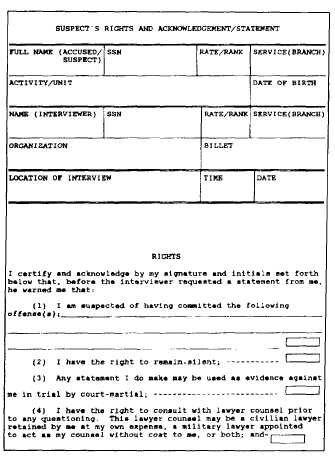| |
request to the court, persons subject to the UCMJ or
employed by the Department of Defense who have a
direct interest in the subject of inquiry must be
designated parties. The court of inquiry has the power
to subpoena civilian witnesses.
Fact-Finding Body Required to Conduct a
Hearing
A fact-finding body required to conduct a hearing is
convened by persons authorized to convene general or
special courts-martial. It consists of one or more
commissioned officers and should have legal counsel
appointed for the proceedings. It is convened by a
written appointing order. The appointing order should
direct that all testimony be taken under oath and/or all
proceedings recorded verbatim. A hearing procedure is
used. Persons whose conduct is subject to inquiry or
who have a direct interest in the subject of the inquiry
may be designated parties by the convening authority in
the appointing order. Additionally, the convening
authority may authorize the fact-finding body to
designate parties during the proceedings. A fact-finding
body to conduct a hearing does not possess the power
to subpoena witnesses, unless convened under Article
139, UCMJ, and JAGINST 5800.7C, chapter IV.
Fact-Finding Body Not Required to Conduct a
Hearing
A fact-finding body not required to conduct a hearing
is convened by a person authorized to convene general,
special, or summary courts-martial, or to impose
disciplinary punishment under Article 15, UCMJ,
including an officer in charge or an officer who holds
delegation of authority for such purpose from the
convening authority. It consists of one or more persons
within the Department of the Navy and may have legal
counsel appointed for the proceedings. It is convened by
a written appointing order. Ordinarily, a fact-finding body
not required to conduct a hearing is not directed to take
testimony under oath or to record testimony verbatim.
However, it may collect evidence by personal interviews,
telephone inquiries, and correspondence. It may not
designate any person as a party to the investigation, nor
does it possess the power to subpoena witnesses.
SUSPECT’S RIGHTS
ACKNOWLEDGEMENT/STATEMENT
A person subject to the cede who is required to give
warnings under Article 31 may not interrogate or request
any statement from an accused or a person suspected of an
offense without first complying with the following
actions:
Informing the accused or suspect of the nature of
the accusation
Advising the accused or suspect that the accused
or suspect has the right to remain silent
Advising the accused or suspect that any
statement made may be used as evidence against
the accused or suspect in a trial by court-martial
Interrogation includes any formal or informal
questioning that either an incriminating response is
sought or is a reasonable consequence of such
questioning. If a person chooses to exercise the privilege
against self-incrimination or the right to counsel under
the Military Rule of Evidence (Mil. R. Evid.) 305,
questioning must cease immediately.
After receiving applicable warnings under Mil. R.
Evid. 305, a person may waive the rights described
therein and in Mil. R. Evid. 301 and make a statement.
The waiver must be made freely, knowingly, and
Figure 11-1.-Suspect’s Rights Acknowledgement/Statement,
NAVJAG 5810/10.
11-2
|

